Reading Time : 25 Minutes
You may have heard or read about Hare Krishna Mission. They are more prominent and most active is USA. But have you ever thought how they run their organisation, from where they get the funds.
Maintaining & building large number of temples, providing free food to the underprivileged people – this all requires money. But do you know from where this money comes from?
Well, maybe you guessed it –the money comes from donation. Many of the followers HK Mission can be seen asking for donation in several public places.
But there is some uniqueness in the way they go out asking for donation. Here is little background to it.
In the late 1960s the mission was really struggling financially; it was quite new and strange religion to many Americans, so it was hard for the mission to raise money.
But then they found a solution.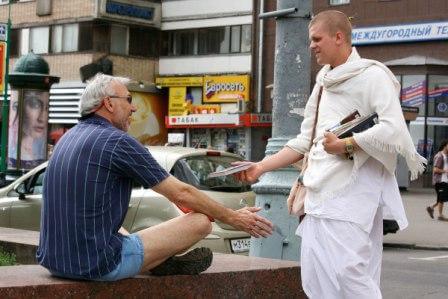
In airports (and other public places), they would simply give the passerbys : a flower, a book or a magazine – what they described as a gift
Then, after the person had the free gift in his or her hand, they would ask for a small donation.
People felt obliged, many of them didn’t feel happy but still their hands still reached into a pocket or a purse, come up with a dollar or two for donation. For years, the Hare Krishna Mission (HKM) raised millions of dollars this way.
What was happening?
How giving a flower or a magazine or a small gift resulted in people responding better as far as donation amount was concerned?
Well, it is same as someone passes you in the hall and smiles at you, you feel compelled to return their greeting. When you don’t, you notice it, it makes you uncomfortable.
This is called the principle of reciprocation. As a human we’re are obligated to give back to others, the form of behavior that they have first given to us.
The people at Hare Krishna used this rule, this behaviors of humans as a persuasive technique to improve their financial condition.
And this is just one of the several ‘automatic behavior patterns (ABPs)’ which almost every human exhibits.
This picture shows top 6 of these automatic behaviour patterns :
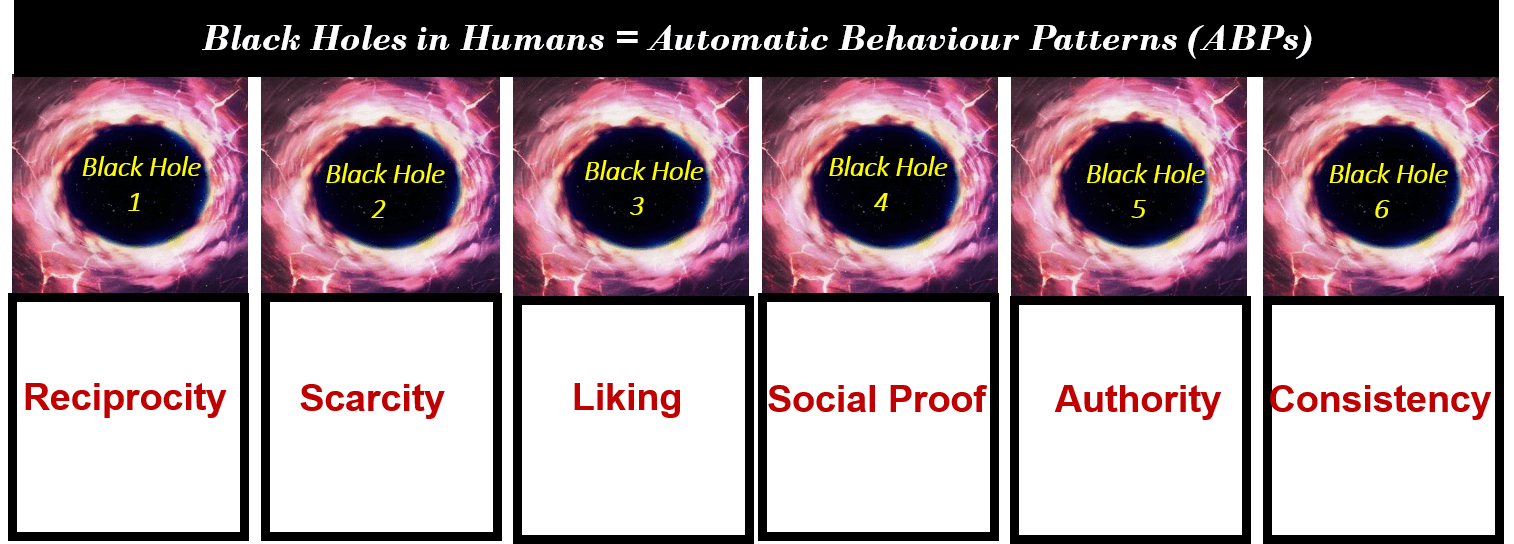
We buy what others buy, we go to the places where others go , we read books what others are reading,we trust in celebrities and politicians, we start hoarding as soon as we come to know that something is in shortage – each of these actions is the result of deep-rooted automatic behaviour patterns in humans.
We all use these ‘automatic behavior patterns’ of others and fall victim because of our own ‘automatic behaviour patterns, to some extent, in our daily interactions with friends as well as strangers, with enemies as well as family-members.
Organisations understand these automatic behaviour patterns very well, they use it to market their products, to make their ideology popular, to gather funds, to get votes and in many other different ways to get something out from masses.
They make us terribly vulnerable to anyone who does know how they work.
These ABPs are powerful because they bypass our rational minds, appealing to our subconscious instincts. They elicit what Dr. Cialdini calls the “click, whirr” automatic response in all of us.
Thirty years ago, Dr. Robert Cialdini wrote a book named Influence on these patterns of behaviours. He listed science-based 6 automatic patterns of behaviour (ABP) in humans .
If someone can master these well, he can easily persuade and influence others.
I am naming these automatic-behaviour-patterns (ABPs) as black holes of human behaviour because under the influence of these black-holes, our rational thinking becomes invisible, our intelligence gets sucked and we get pulled by something like we are not in control.
On the other hand, if we can understand these black-holes, we can live an above average life, can do better than others in whatever field we are working and won’t be fooled by the various factors which are trying to control us every minute.
Let’s first understand the real meaning of a black-hole before we explore the black-holes in ourselves.
According to NASA,a black hole is a place in space where gravity pulls so much that even light can not get out.  The gravity is so strong because matter has been squeezed into a tiny space. This can happen when a star is dying.
The gravity is so strong because matter has been squeezed into a tiny space. This can happen when a star is dying.
Because no light can get out, people can’t see black holes. They are invisible.
Just like black-holes in space, there are black-holes in our personalities, invisible black holes!
These are our automatic behaviour patterns – these automatic behaviour patterns (ABP) , just like black holes in space, have immense power of attraction which paralyses everything in its sphere of influence, they force us to bypass our rational thinking thus converting most of the humans just a member of a herd.
Why You Should Know About These Black-Holes
Marketing is all about understanding human behaviour.
In the end, you’ve to convince your potential customers to purchase your product or service and prefer it over the competitor’s …
…and it’s very unlikely that they will do it out of the kindness of their hearts.
Instead, you need to be able to tap into their behaviors -their deep seated social norms, moral codes, or maybe even different survival mechanisms that still exist after millions of years of evolution.
And to do that , knowing these automatic behaviour patterns, the black holes , is very important.
This would not only help you to focus your energy and resources in a more efficient way ,this would also open many unknown paths for you :
- If you would like to have effective promotional strategies to grow your business
- If you want to improve/promote your personal as well as professional life
- If you don’t want to get trapped by the promotional techniques used by others in order to avoid making irrational decisions
Keep In Consideration:
Understating these black-holes (ABPs) can help you to promote yourself as well as your brands ,do note that while this can help bring more awareness for your brand, but in the end the biggest factor still remains on quality and usefulness of your product.
All marketing techniques as part of a marketing strategy will only work when they’re supporting a product or a person that provides true value for money to the customers.
Let’s try to understand these ABPs in full detail :
Black-hole 1 –ABP of Reciprocation
–Law of Giving Back
You read the story of Hare Krishna Mission (HKM) at the beginning.
How people felt obliged to pay back (in form of a donation) after getting a flower or a magazine which has little or no value to them.
Let’s look at one more example !
In many countries, if you visit retail shops they would offer you some tea, coffee or cold-drink as soon as you enter the premises.
What’s the strategy here?
They all offer a reward to their potential customers before they even make a purchase.
“Why they should give away something for free?”
They’re in reality, trying to tap into a black-hole of human behavior. The black hole of feeling indebted .
When you offer something first for free, if it’s helpful, people feel a real sense of indebtedness towards you. And they try to reciprocate.
When business owners offer a small gift for free to their potential customers, they were basically creating a social obligation for them to return the favour, to reciprocate.
People will be nice if you’re nice to them.
One may argue that being nice to someone who is nice to you is good ! Why we’re naming it as a black-hole.
Well, there’s nothing wrong to be considerate towards someone who is considerate towards you but there’s a trick here.
By offering small gifts, the giver‘s intention is get multiple time returns. By offering you a tea, the shop-keeper is trying to make sure that you would not leave the shop empty –handed, you would buy at least something and you may negotiate less on price.
In HKM example, we found that by giving a flower, HKM volunteers got donation in dollars, the amount which was higher than the price of a flower.
Why Humans have this black-hole?
It is because people will feel indebted, which makes them more likely to have positive response to your future requests.
It’s also because as people, we’re deeply wired to be reciprocal.
This is also probably because there are some very obvious benefits for everyone with the rule of reciprocation; it’s one of those rules that likely made it easier for us to survive as a species.
Therefore, if you do something first, by giving them something or doing something nice for them, it is more likely to come back to you.
How marketers (and you can) use this black hole ?
There are 3 factors if someone wants to use this ABP in a more effective manner:
- Offer something First – Allow them to feel indebted to you
- Offer something Exclusive – Allow them to feel special
- Personalize the offer – Make sure they know it’s from you
Here size of the favour or the offer doesn’t matter.
Something as small as giving a flower has been shown to influence people well beyond its monetary value.
That’s why when followers of Hare Krishna offered a flower whomsoever they met – people were more magnanimous when they are asked for a donation.
Reciprocation works on various levels.
We are more likely to trust someone who trusts us. We share secrets with people who share secrets with us.
How to resist this black hole?
If you want to resist this then you need to refuse the initial favor or gift. Once you accept, it becomes harder to stay outside the influence.
Black Hole 2 – ABP of Scarcity
-Fear Of Missing Out
In late 19th century huge diamond deposits were discovered in the mines of South Africa. The British companies, which were operating these mines, realized that if all the diamonds were released in the market, the prices would fall down and the number of buyers would go down as the exclusivity tag won’t be there..
To overcome this problem, they devised one of the most successful marketing campaigns of all times.
De Beers Consolidated Mines Ltd. (now De Beers) was formed monopolised the global production and distribution of diamonds, and supply was controlled perpetuating the illusion of scarcity of diamonds.
‘A Diamond is Forever’ campaign was created to build an emotional association with the gem – a symbol of love, commitment and marriage.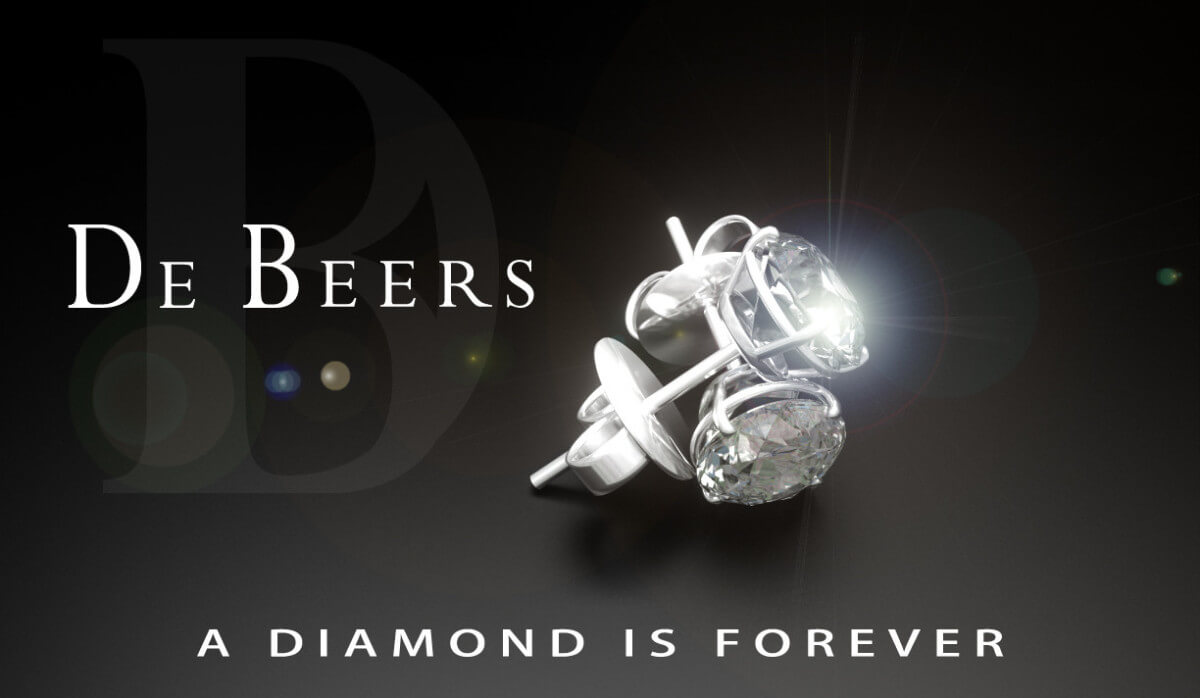
Special scenes were added in Hollywood movies , stories were tweaked to make hero to propose for marriage with a diamond ting. Thus began the tradition of engagement ring.
Till now, the number of diamonds in circulation in the world market at any given time is carefully controlled by a few companies.
And ever since the demand for diamond engagement rings has been steady despite their relatively low resale value, fueled by the enduring deception of scarcity.
How it happened?
It can be roughly simplified down to this : the more scarce a resource is, the more people are ready to pay premium in order to acquire it and the more common a resource it the less people will be enthusiastic to pay to get it.
This black hole suggests that humans will consider a scarce commodity to be more valuable as compared to one that is in abundance.
Why it happens?
It is based upon reactance theory of human psychology.
| It says that when people feel that their freedom to choose an action is threatened, they get an unpleasant feeling called ‘reactance’. This motivates them to perform certain behaviors by which they want to prove that their free will has not been compromised.
So, when we think we might miss out, not be chosen, or be denied what we want, we react You can see it very clearly in children. When you tell Johny he can’t eat his chewing gum, he immediately gobbles it up. Apparently, according to the research, grown-ups are no different. |
Many a times we end up buying things that we may not even need and on several occasions we stop looking for options. The black hole of scarcity takes over our mind, and other rationales take a back seat.
How marketers (and you can) use this black hole?
Few companies tend to trigger their customers’ sense of urgency in following ways:
- Limited-number – Item is in short supply
- Limited-time – Item is only available during a limited time period.
- One-of-a-kind Specials – One time offer. Festival specials, Anniversary specials,
We can see this black hole in action in our daily life.
For instance, sites like makemytrip.com tell you how many seats are left while booking a flight- ticket, hoardings outside the shopping malls shout about ‘last-day-of-sale’, a real-estate broker tries to impress upon you to take a quick decision as there’re other buyers are in the queue for the house you zeroed-in.
Tactics such as this heighten anxiety over the possibility of missing out and therefore generate a sense of urgency to act as soon as possible.
How to resist:
Calm down, give it a pause, think whether you really need it, and think whether it can wait for few more days, check data from different sources.
Black- Hole 3: ABP of Liking
–Law of Attraction
You can visit a website named PetRelocation. They help pet owners all over the world move their pets from one country to the other.
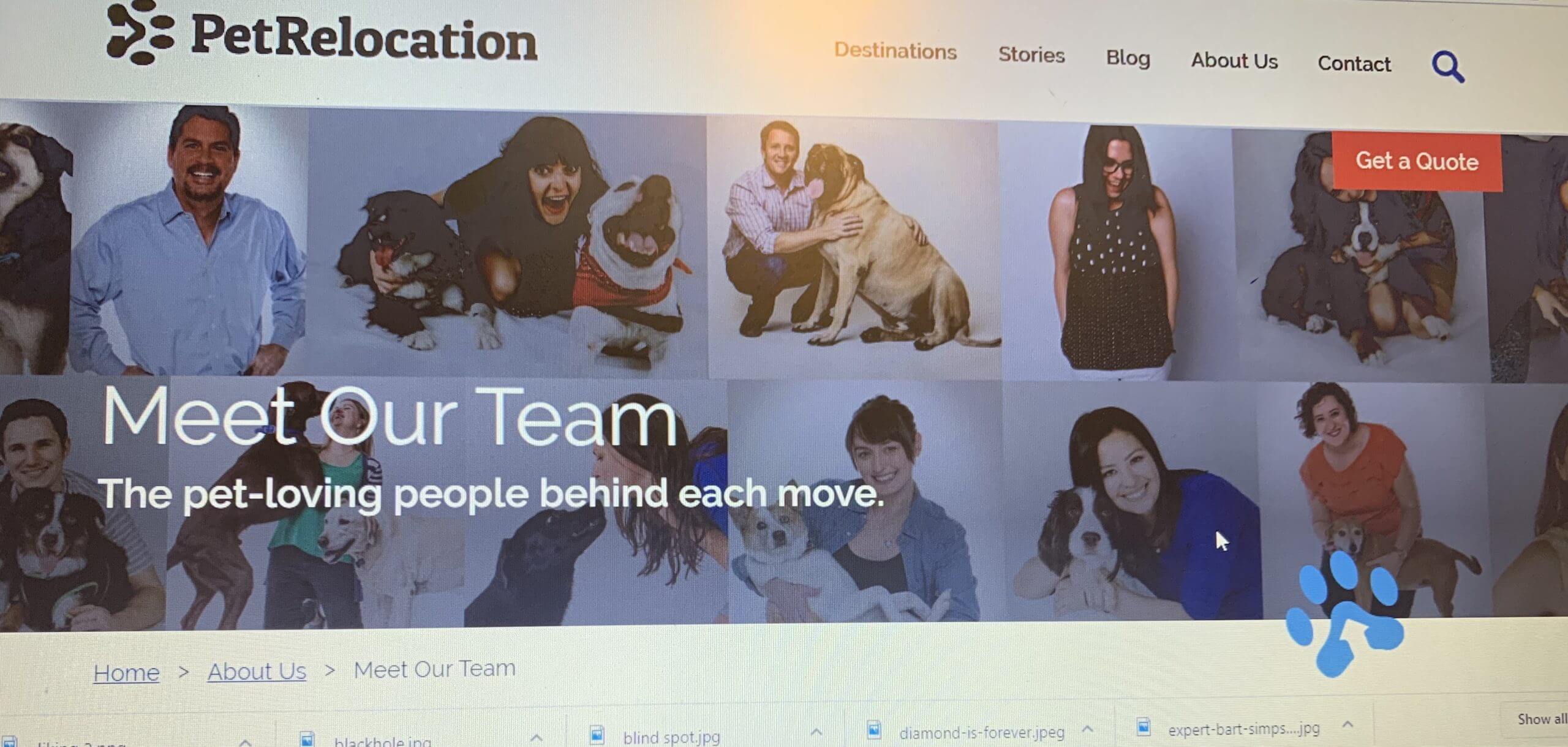
If you visit their “Our Team” page, it is full of staff bios, and every bio emphasizes not only the staff’s love of dogs, but also humanizes managers and employees . The tagline says ’ The pet-loving people behind each move’ – this is very important positioning as most of the pet lovers treat their pets as their family members and they’re sensitive about the fact that their pet is given love & care by everyone.
By this page, the company is trying itself to make itself likeable . Company is trying to convey –‘ you love pets, we also love pets’ , ‘we only employ those people who love pets’
The effort increased the company’s likeability, which in turn improved the conversion rate of website visitors.
The company here is trying to take the benefit of another black hole of humans – Liking – an automatic behaviour pattern.
We prefer to agree to requests from people we like more than from people you don’t like.
Think about it?
And which kind of people we like?
We like those people who tend to have the same beliefs, interests, and language as we do. So the mind tends to believe that a person we like is trustworthy, otherwise, why would we like them at all?
Can you say no to a good person, a person who is so similar to you?
One way people exploit this is to find ways to make themselves like you.
And people try to find similarities to establish a rapport, to make that initial connect and relationship, as it we tend to like those people who like the same things that we like.
Do you like chess? Me too.
Do you like that book? Me too.
Oh you worship Sai Baba! Me too.
(be careful this is applicable only in those areas where likes are not so common . It does not work in those everyone likes someone or something.)
Although often these are genuine, sometimes they’re not. It is a double edged sword, it can be great for honest, respectable, decent people. But be careful, it can also work wonders for skilled & shrewd salesmen and someone who want to exploit your vulnerabilities.
Few examples:
How marketers (and you can) use this black hole?
You also like people more if they like you.
- Tell your customers that you love them
This is why, in USA, a person named Joe Girard, the world’s “greatest car salesman, sends every customer a holiday card with the message “I like you.”
And you know what, it works. People go back to him.
2. Advertisements using celebrities
The black hole of liking also explains why we trust word-of-mouth recommendations from our peers, as well as stuff endorsed by our favourite actors, sports-persons or celebrities.
3. Inbuilt tools in websites
That is why there are options of ‘share’ ,’like’ are there in almost all websites. If you like or share something , it is shown on your timeline and most of your friends are likely to watch or read something as it has been endorsed by you.
4. Compliments
Compliments also stimulate liking, and direct salespeople are trained in the use of praise. Indeed, even inaccurate praise may be effective
5. Show your positive side
For many companies, budget for marketing of their CSR activities is much higher than what is spent on those CSR activities.
These companies understand that people like the companies who help others, the companies which work for social cause. To exploit this sentiment and to be liked by their customers , many companies spend a little on CSR but spend more on marketing of their CSR activities so that their customer can notice it.
How to resist:
Calm down, give it a pause, think whether it is real, and think whether there’s some hidden motive involved .
Black hole 4 : ABP of Social Proof
-The Herd Behavior
Rose Perot was an American billionaire, he campaigned become US president in 1992 and 1996. It is said that at one point of campaign, when all the surveys were showing that he  was lagging far behind than other candidates, he asked his campaign managers whether they can come out with a survey where he can be shown as leading candidate.
was lagging far behind than other candidates, he asked his campaign managers whether they can come out with a survey where he can be shown as leading candidate.
Why he wanted to do that?
Well the whole idea was to take advantage of another human behavioural black-hole – many of the voters want to back up a winning candidate, they don’t want to waste their votes. They feel that if majority of population is voting for a certain candidate, that candidate may be the best choice.
That’s why many political parties come out with fake surveys before elections, they want to impress upon the undecided voters that their candidates are winning. Even if they can manage one or two percent swing in their favour, that may prove final difference between winner and loser.
Let’s look at another example. Many of the parents in certain countries push their children to pursue studying engineering or medicine. This is because other parents are pushing their kids for similar careers. In end, it becomes an endless loop. No-one thinks about the pros and cons, but everyone want to be part of the herd.
This black hole in human behaviour is also known as automatic behaviour pattern of Social Proof. We tend to go with the waves, to follow what others are doing.People learn from observing others especially when they want to fit in certain culture.
If a child is scared of the ocean but has the opportunity to watch other kids playing and having fun in the sea, he will learn from them ,and after some time, lose fear and join in.
Consider walking in in a foreign city. You’re starving and have no idea “where you can get food?” here. Suddenly, you come across a restaurant which is very crowded. And that’s exactly where you’re likely to eat.
People will more likely say yes when they see other people doing it too. This is amplified in situations of uncertainty, where we look to others for cues on what we should do.
“When should I reach?”
“Who’s going to be there?”
“What should I wear?”
“Which car I should buy?”
It’s not so much that almost all of our decisions are influenced by it.
Why it happens ?
Think how you would act in any new environment: at a new workplace, at a get-together where you don’t know anyone or in a foreign country.
Every reasonable person first will observe what others do before making any decisions regarding their own behavior.
This can be related to our evolution as a human. Evolution taught us to think in this way. Humans that would appear in a new tribe and would talk and behave without understanding the language and rules of that tribe were killed.
How marketers (and you can) use this black hole?
We tend to have more trust in things that are popular or endorsed by people that we trust.
That’s why most of the advertisers tend to rope in popular celebrities from movies or sports, they tend to dress people like doctors or someone giving a look of an expert in a specific field.
The key here is to tap on the influence or social proof from these types of people:
- Experts – Approval from credible experts in the relevant field
- Celebrities – Approval or endorsements from celebrities (paid or unpaid)
- Users Testimonials– Approval from current/past users (ratings, reviews and testimonials)
- ‘Wisdom of crowds’ – Approval from large groups of other people
- Peers – Approval from friends and people you know
- Reviews :On e-commerce sites, positive reviews help in attracting more customers
How to resist:
Calm down, give it a pause, think whether the person endorsing is a real expert, whether the celebrity in the advertisement is a real user, whether these are paid reviews ???
Black Hole 5: ABP of Authority
Trust me, I’m a doctor.
All of us have seen TV advertisements of different toothpastes? Have you ever thought why in most of these advertisements you see a doctors /dentist?

And mind it, they are not doctors. They are all actors dressed like doctors as doctors are not allowed to promote any product.
Companies use these lookalikes to give you an impression that their brand has been recommended by doctors.
This is because the companies want to take advantage of our behavioural black-hole of following the people who look like they know what they’re doing.
This holds especially true in fields where we aren’t experts.
Why it happens?
We’re taught from a young age to listen to those in charge.
It’s easier to trust an authority figure in the field than it is to do your own research on any given topic.
How marketers (and you can) use this black hole?

Look at the above pictures closely.
These are world’s famous politicians with world renowned religious leaders. What are they doing with each other?
Well, there’s a chance that they’re trying to use the principle of authority to influence their supporters as well as non-supporters.
If President Obama respects the Pope , I should also respect him or vice versa.
Same is true with the rest of two pictures- religious leader is sending a signal that people-in- power also value their opinion and people-in-power are sending a message that even the people who’re considered holy also support them. This helps both sides- masses fall for it. They feel enamoured about their leader as he/she is being endorsed by another powerful leader from another domain.
You can see this in a lot of online marketing with headlines and blog posts that include phrases like “scientists say”, “experts say”, “research shows”, or “scientifically proven”.
That’s why many companies try to attract talent by getting a certificate from organisations like “Great Places to Work “, few tend to project themselves as well-respected companies by highlighting some awards which are won in the events sponsored by them only.
You can also give off the air of authority if you pay attention of these factors:
- Titles – Positions of power/experience
- Clothes – Superficial cues that signal authority
- Name–taking – Few people carry
- Members of renowned Organisation – Few people tend to put a badge of some local organisation e.g. Rotary Club, local political parties
How to resist:
Calm down, give it a pause, people in position of power or people who are popular can be domain experts but they can’t be right about everything.
Black Hole 6 : ABP of Consistency & Commitment
Your Image Can Be Your Enemy !
In early 1990, a toy manufacturer in USA used to create hype about any particular toy (let’s say toy A) before Christmas season.
Kids would watch TV advertisements and would make their parents to commit that at the time of Christmas they would buy toy A.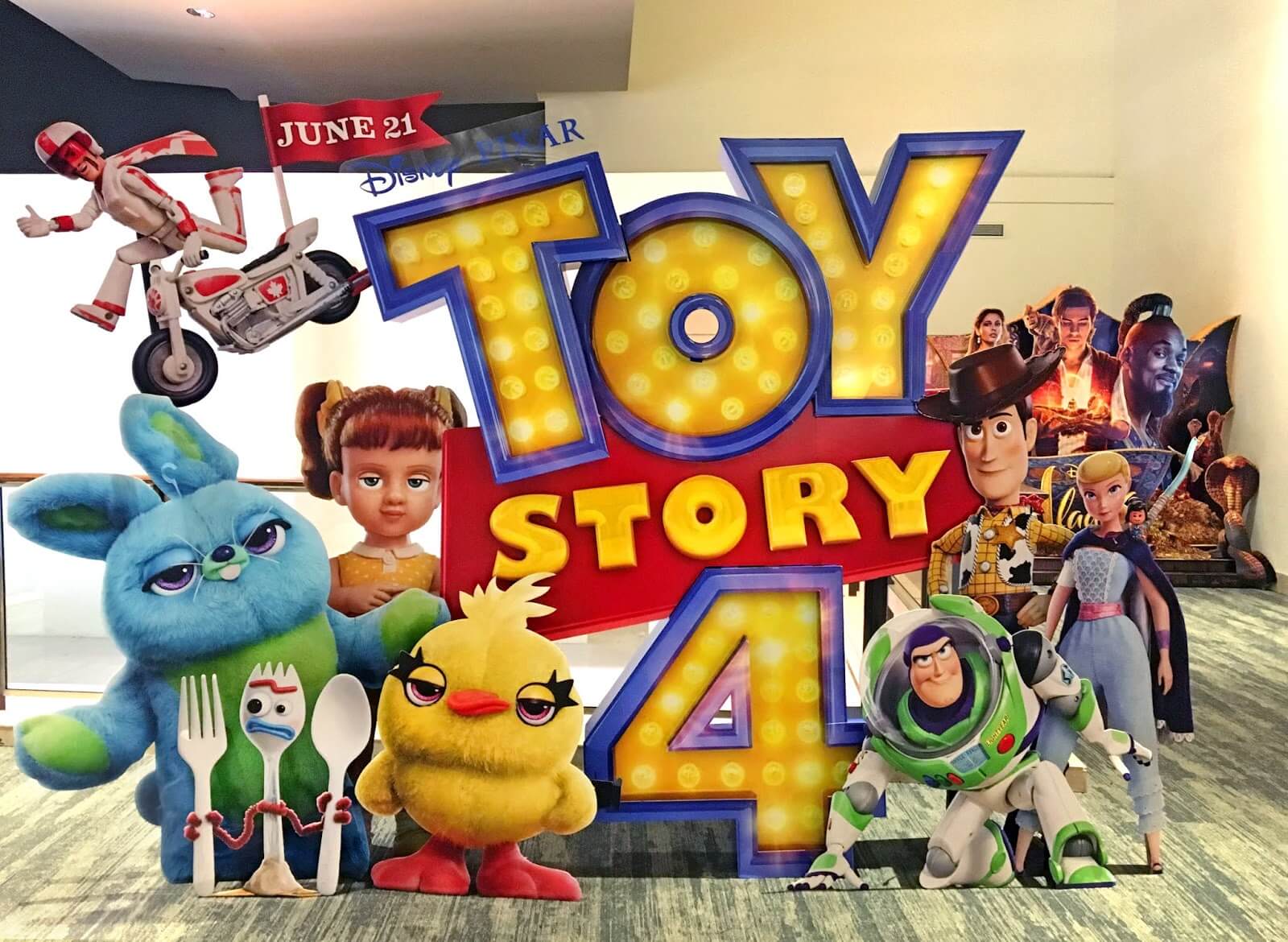
But at the time of Christmas holidays, the company would intentionally reduce the supply of toy A, so won’t be available to many parents when they come to purchase it.
With that option gone, the parents then fall back to buy another toy, but in the back of their mind, they know the child won’t be happy.
Then, once the Christmas season was over, company would again come out promoting the toy A, and they would flood the market with supply.
The parent who had made the commitment felt compelled to go back to store to buy that toy.
In this way , the toy manufacturer was able to smooth out their sales cycle by essentially double-dipping — getting you to buy a less popular toy during the holiday shopping season and then getting you to buy the popular toy in the slower sales market.
The company was smartly using one of the automatic behaviour pattern of masses – to be consistent with the commitments.
The black hole of commitment means that we all have a deep need to be seen as consistent.
It means we’ve publicly committed to something or someone, we’re much more likely to keep that commitment on consistent basis.
For example, if we admit in public that we support one political group or we like a certain product, we would keep on defending the same even if some negative information comes out about that group or product.
It can change the course of your life ?
People sometimes may try to trap you in a certain image – like ‘you always help’, ‘you can eat anything ‘ , ‘he is a great drinker’, ‘he is an early -morning riser’, ‘you’re multi-tasker’ – all these images forces a person to act according to what others are saying. Just to keep that image.
You may notice that all these images ,which others try to impose upon you , sound nice on surface level – but one needs to think deeper ! Whether one wants to commit to a certain image or he/she would like to keep the options open.
And many a times sticking with an image, which other force upon you , may not be good or helpful for your well-being .
Many a times we try to live an image , even at the cost of jeopardizing our other priorities. And on several occasions, we get stuck in these images of ourselves , taking a whole together different path in our lives which we never intended to take at the first place.
It can also happen that we get stuck with certain images ourselves,image of what we think of ourselves e.g ‘oh ,I can’t do this thing’, ‘oh, i am not lucky ‘, ‘I am not a multi-tasker’ etc etc. We commit ourselves to these images and act accordingly.
This is a dangerous thinking and it prohibits us to live upto our potential.
Why it happens:
- It happens because we’ve so many choices and decision to make daily, s commitment and consistency makes our lives easier by reducing the amount of things we have to think about.
This is the result of one of our evolutionary trait, a trait make us to act to conserve our energy every time. Energy conservation was important in early human days when food (source of energy) was scarce and there were lot of efforts and risk involved to get food
In certain matters, we just make a single decision (like which group or team to support, to buy which company’s products), we commit to it and use that as reference for subsequent related choices.
This is like taking advantage of a mental shortcut we all use to simplify our decision-making.
2. As a human, we want to be trustworthy, we want others to believe us , to rely on us. And if we give our words in public, there is higher tendency to stick with our stated positions
How marketers (and you can) use this black hole?
How do you earn the loyalty of people who don’t quite trust you yet?
The fastest, most effective way is to make them commit to something (a statement, a stand, an identity), and stick to it.
Let’s walk through these requirements in a little more detail.
Make people to start :
Having people say they will do something is a start, but when they actively commit to it they’re much more likely to follow through.
Make their commitment public
The next piece is making it public. When other’s witness this commitment, it adds a level of accountability to the statement. And no one wants to go back on their word.
Like asking people whether they would support providing some annual fund for helping education of poor kids. Ask this question in your WhatsApp family group.
Few people would commit, start with a minimum amount.
Next time whenever you need help to support this kind of social activity, send a message in the same group listing the name of last-time donors, say that these guys are great philanthropists, they have a kind heart and you’re sure that they would support again.
See the effect, most of the people who donated last time would come back again.
Caution: It has to be voluntary. If you force someone to make an active, public commitment that they didn’t decide on themselves, you’ve accomplished nothing.
How to resist:
Calm down, give it a pause, think before committing as it may have long term consequences as they say ‘never commit anything when you’re too happy or when you’re too angry’.
Conclusion:
These 6 black holes have been used for decades by businesses and marketers to get you, the consumer, to part with your hard-earned money, your attention, your opinion, and your vote.
Pay close attention to these black holes. Learn what they’re about and how to apply them to your business .
A request : If you have reached till here, that means you’re an above-average person who has a curious mind. Would request you to please share it with your friends, colleagues and class-mates as the purpose of my effort of writing is to create a better society. Help me in this small effort, it is easy, just click on Tell Others button on the left hand side.
Thanks in advance.
12 claps

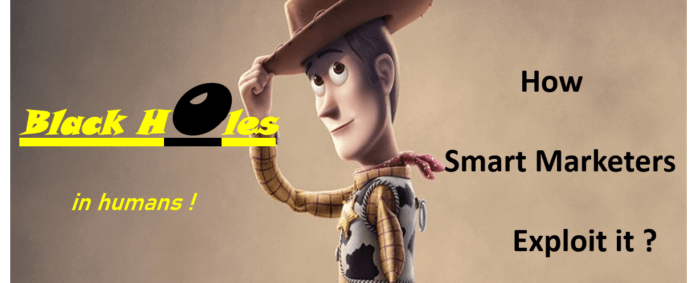

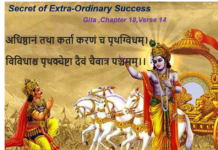

Very structured narration of happenings with live examples. Knowledge provided in the article is good not only for Sales/marketing persons but people working in different sphere of working environment.Indeed very good article.
It is a very very nice article and has given me immense knowledge and a new perspective.
Thanks for sharing. You are helping me to be a better person/manager/human.
[…] if you want to read about all these traps in one go, click here. […]
[…] if you want to read about all these traps in one go, click here. […]
[…] if you want to read about all these traps in one go, click here. […]
[…] if you want to read about all these traps in one go, click here. […]
Thanks for shaping my thoughts & mind. Wonderful .